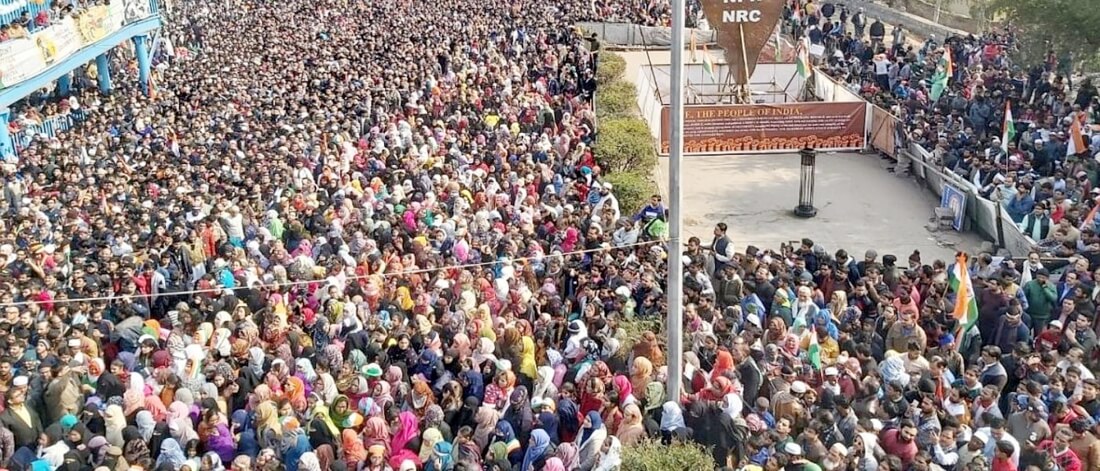Delhi 2020 Verdict - A Much Needed Blow to the Modi-Shah Regime

AFTER a vicious BJP campaign to conquer Delhi we now have the results of Delhi 2020 Assembly elections, and it is almost a repeat of the 2015 elections. AAP has by and large retained its 2015 vote share of more than 50% even though its seat tally has dropped marginally from 67 to 62. The seats lost by AAP have all gone to the BJP raising its tally to 8. The Congress once again could not open its account and if AAP managed to retain its 2015 vote share it was at the cost of the Congress. Traditional Congress voters among Dalits and Muslins almost en bloc migrated to the AAP while almost an equivalent share of erstwhile AAP voters shifted their allegiance to the BJP.
This is one election where we can perhaps clearly say that the BJP campaign has backfired. The party had begun with the slogan 'Desh Badla, Dilli Badlo' (India has changed, now change Delhi). But as protests against the CAA-NRC-NPR design intensified, the rattled regime thought it could also scare Delhi voters by projecting Shaheen Bagh as Pakistan or a symbol of restoration of the Mughal Empire, and 'shoot the traitors' became its central campaign theme. And as the clamour increased, it became not just rhetoric but a real call to action with armed goons launching violent attacks on students in Jamia and JNU and women protesters at Shaheen Bagh. It dismissed all the AAP claims and promises of cheaper electricity and water and improved education and health care as 'freebies' while unleashing brutal repression on JNU students to inflict a massive fee hike.
The UP CM who instigated the police in his own state to take revenge on the anti-CAA protesters, launching a veritable war on the Muslim community and protesting activists, accused Kejriwal of feeding biryani to the Shaheen Bagh protesters and asked the voters to bring BJP to power so it could serve bullets to the protesters. Some other campaigners dubbed Kejriwal a terrorist. When the campaign did not seem to evoke the expected response and exit polls predicted a renewed AAP victory in Delhi, sections of the pro-Modi media even termed Delhi voters indifferent to national interests represented by the BJP, if not outright traitors to the national cause, and addicted to 'freebies' offered by the AAP government. And this intense hate was sprayed in the air through a relentless high-decibel campaign spearheaded directly by the so-called Chanakya of the BJP, home minister Amit Shah, who called upon the Delhi voters to press the lotus button with such intensity that it could deliver an electrical shock to the Shaheen Bagh protesters.
The emphatic defeat of the BJP in Delhi marks a defeat for this vicious and intense hate campaign led directly by the Modi-Shah-Yogi triumvirate and their minions. And in a befitting reply to the BJP's vitriolic arrogance, the AAP candidate from the Shaheen Bagh locality won with the second highest victory margin. Nitish Kumar's JDU suffered the humiliation of the biggest defeat as Kumar's claim of his government outpacing Delhi in terms of development fell flat spectacularly. It is true that as a centre-right party, AAP shares considerable common ground with the BJP in terms of economic policies. AAP's notion of nationalism too has a lot in common with the BJP's model of hyper-nationalism, as reflected in its total endorsement of the Modi-Shah Kashmir policy and several such questions. AAP's response to questions of democracy in terms of opposition to state repression and communal violence and defending rights of workers, women, dalits, minorities and other marginalised communities is also pretty muted and problematic. It is also true that the AAP victory in Delhi has its specific local context and cannot perhaps be replicated in the larger context of Lok Sabha elections and all-India politics. But in spite of all these specificities and limitations, there can be no minimising the enormous significance of the Delhi verdict at this crucial juncture of Indian politics in the face of the unbridled fascist onslaught following Modi's return to power for the second successive term.
It is the task of progressive democratic forces in Delhi and beyond to build on the huge potential of the Delhi verdict. The outcome has underlined the centrality of basic issues like education, health, electricity and water - issues highlighted by the AAP government - as the foremost concerns of the common people. This agenda should be expanded and pursued vigorously to ensure real gains for the people in terms of attainment of their fundamental rights and fulfilment of their basic needs and aspirations. Coming in the wake of the decisive defeat of the BJP in Jharkhand only a few weeks ago, the verdict also demonstrates the growing anger of the people and vulnerability of the Modi-Shah regime defying all talks of the regime's electoral invincibility and the disastrous impact and implications of the Sangh-BJP divisive agenda. From Kashmir and Ayodhya to the CAA-NRC-NPR conundrum, the BJP played all its cards in Jharkhand and Delhi and yet got routed quite decisively. This certainly augurs well for the anti-fascist resistance. The breather provided by the people of Delhi must be utilised fully to intensify the ongoing protests against the CAA-NRC-NPR design and to hand down equally decisive defeats to the BJP and its allies in the forthcoming rounds of elections later this year and early next year.
Charu Bhawan, U-90, Shakarpur, Delhi 110092
Phone: +91-11-42785864 | +91 9717274961 E-mail: info@cpiml.org

